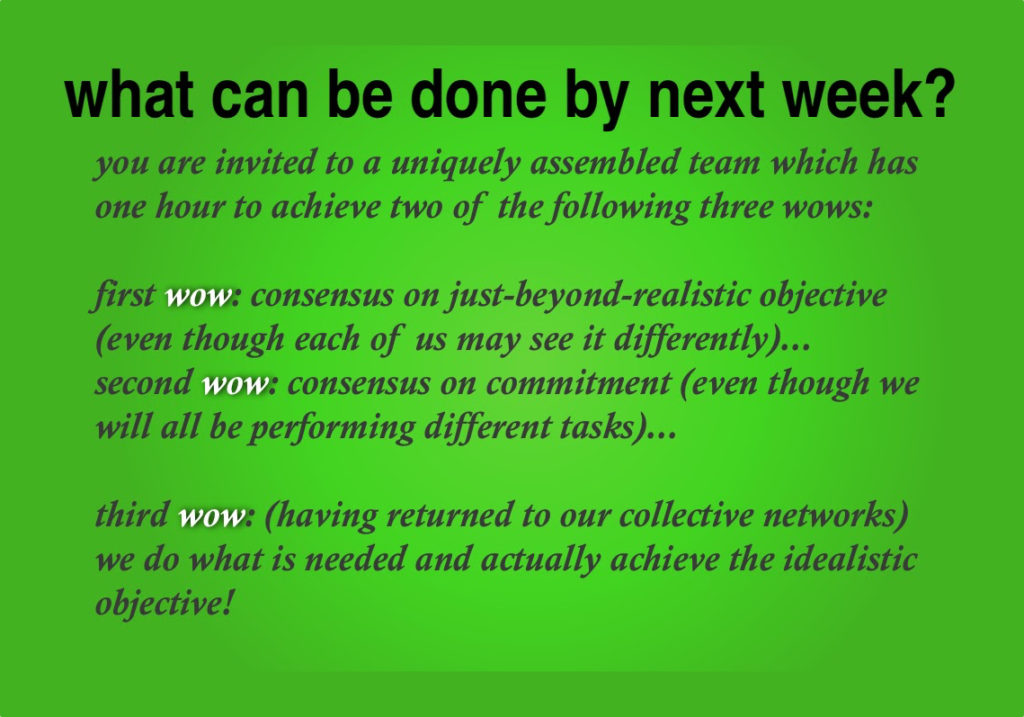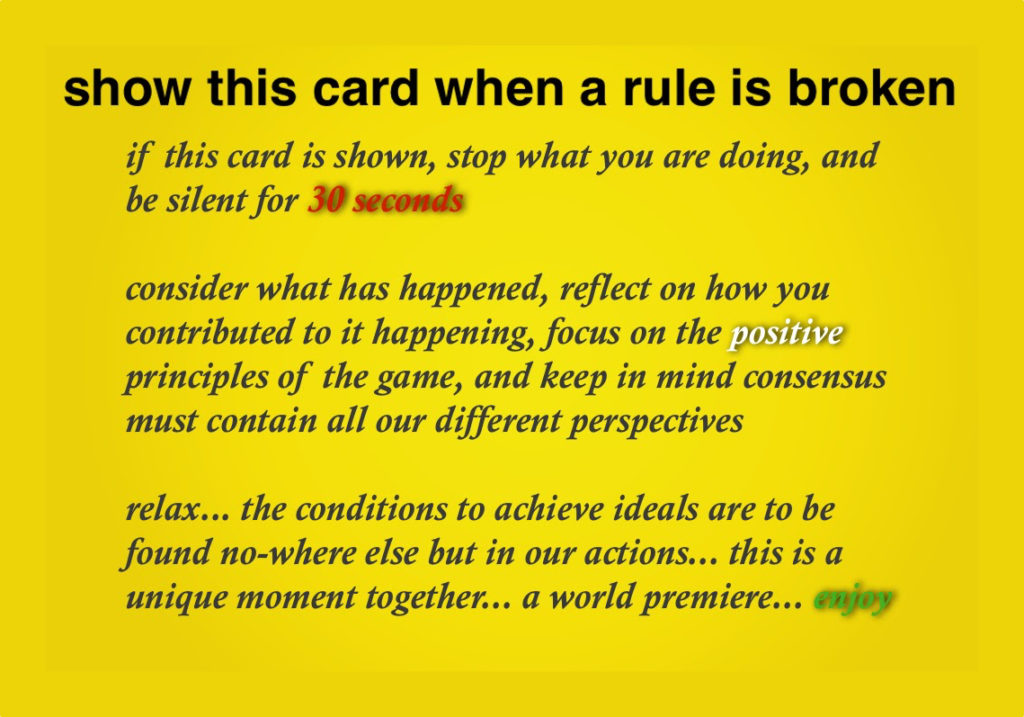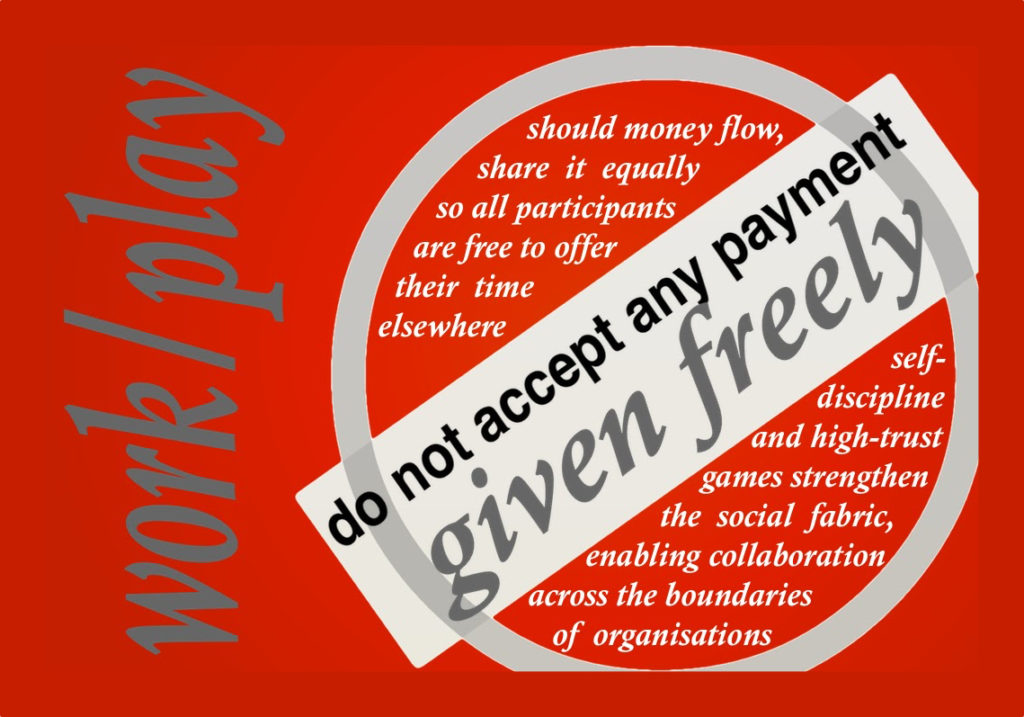How do you achieve unrealistic objectives with people you don’t know well within ludicrously short periods of time?
Forget Think Tanks and individual training programmes. Learn through practice: the Action Cycle.
The Action Cycle uses rules contained on three business-sized cards.
Green Card: Objective
The main question to answer is “What can we (the people in this room now) achieve (just beyond realistic into idealistic) within the week (given our collective resources)?” which can be measured by the following three thresholds, or wows:
- first wow: we achieve consensus on a mutual idealistic objective (even though we may see it differently)
- second wow: we achieve collective commitment (even though we will all be performing different tasks)
- third wow, after the group has broken up: (we actually do what is needed over the week and achieve the idealistic objective)


The original formation of the group must be carefully considered since the achievement of the action group will depend on the resources being available to the collective. Often it is the executive capacity that is missing from a “soft” action group of well-meaning but “traditionally powerless” individuals. Ideally an action group has the following constituents:
- three vertical individuals (people aligned vertically from a company, government, or any form of hierarchical organisation)
- three horizontal individuals (people practiced in the techniques of the game, of achieving results in a non-hierarchical structure)
- three diagonal individuals (self-selecting individuals, effectively random, who may occupy any position of any structure)
This should provide the right combination of skills and resources enabling the action cycle to achieve an idealistic goal, goals which are impossible relative to each individual and for any standard hierarchical closed group (ie company).
Yellow Card: Rules
- no oppositional state — yes! (from A-or-B to A-and-B)
- no brain storming — observe and insight (just bring what you know and be sensitive to new ideas that emerge naturally)
- no splitting — maintain unity (into pairs, etc, or postponing positive engagement for afterwards)
- no pulling — return attention (to self-ego-me the past or future, just be present and think of the objective and the steps required to achieve it)
- no judgement — assume genius (evaluate for sure, but just don’t think it is foolish)


The yellow-red card procedure might be useful to prevent a group from failing itself. Everyone agrees to playing the game by accepting to uphold the rules of the game, and the following rule for the yellow card (and the red that accompanies it):
- if anyone in the group perceives a rule to be broken, they hold up the yellow card and the entire group must stop what they are doing introducing a period of 30 seconds silence in which everyone considers their role in what is happening
Red Card: Moneyflow
One simple rule for the operation of the red card, to complement the yellow one:
- if anyone in the group flaunts the yellow card or abuses it, any individual may hold up the red card which threatens that the individual leave the group thus bringing the action cycle to an end
Once the hour is up, if the players have not acheived two of the three wows, they should call it a day. Of course, there may be offshoots, with some people working together. However be aware that allowing offshoots may reduce the intensity of the action cycle itself, since players may stop thinking they need to reach consensus and settle for a small group agreement; in effect, they are bending the ‘no splitting’ rule.


Success is measured by how far in the wow-sequence the group gets, with the minimal being an interesting discussion for an hour, and the maximal being the third wow achievement. Should this last wow occur, there may be consequential moneyflow.
With the development the Sqale WebApp, the moneyflow should be treated as follows:
- Action Cycles are invited using the Sqale platform which may be set to a specific amount, a range, or any amount according to each member and who they invite. The initial outlay of moneyflow is constituted by the players, or the originator, though it might fall upon the vertical players (ie hosting company).
- The third wow may result in moneyflow directly, eg support for a video produced during the week, as distributed through Sqale platform. Moneyflow should be distributed to all participants equally, or according to the SQ balance within the group as enabled by Sqale platform. Players evaluate the contribution of the other players during the hour, and subsequently deriving a unique SQ for each player.
- Evaluations of the hour itself may be tracked using the Sqale platform.
- With nested projects, SQ may be tracked across different action cycles deriving player rating which may be useful for guiding player invitations.
When an ecology of action cycles evolves, individuals will be in a position to offer their services towards a pre-accepted objective (eg a Happening Hotel) with longer periods of time, in a month or a season or a year, and perhaps with equivalent scaling of groups to 100 or 1000 or more players.
Results
Use of the cards in chronological order (with success rates measured in wows):
- tuttle club (wo)
- shine unconference (w )
- lean business london meet (wo)
- rewire london ()
- london creative lab (five groups: w, wo, wow, wow, wow)
- remade in brixton (wow+: achieved idealistic objective, and it repeated)
- facilitation bar camp (w )
- thinking hotel (2 groups: wo, wo)
- scotland colleges (wow)
- social change institute (wo)
Key: w – one wow wo – two wows wow – three wows



